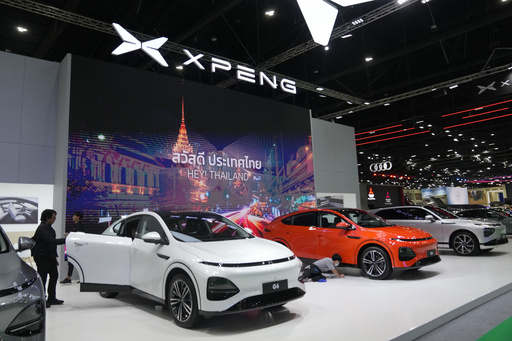BANGKOK (AP) — Chinese electric vehicle makers are showcasing their latest models, including a flying car, as they take on global rivals at the Bangkok International Motor Show.
Companies like BYD, XPeng and Great Wall Motors are quickly growing their sales in Thailand, challenging longstanding market leaders like Toyota, Isuzu and Ford, as they expand exports across the globe.
And Thailand, one of the biggest markets in Southeast Asia, a region of more than 600 million people, has made developing its EV market a priority.
Tesla launched sales in late 2022, offering its popular Model 3 and Model Y at prices aimed at competing with rivals like China’s BYD.
BYD, or Build Your Dreams, displayed a wide range of its EV lineup, including its Dolphin, a pure EV that it says runs 490 kilometers (about 300 miles) on a single charge and is priced at 859,999 Thai baht ($23,700).
At the higher end of the spectrum is the Seal, promising 580 kilometers (about 360 miles) on a charge and costing nearly 1.6 million baht (about $44,000).
BYD sold 30,650 EVs in Thailand last year, followed by 12,777 sold by Neta, a brand of Chinese electric vehicle maker Hozon Auto, which is based in eastern China’s Zhejiang province. They were trailed by Tesla, British brand MG and Chinese car maker Great Wall Motor.
“It’s very colourful now. Many brands come in. I think this is very good and it’s looking very bright for the whole market of EV cars to be honest,” Pratarnwong Phornprapha, chief executive officer of the REVER Group, BYD’s distributor in Thailand, said in an interview.
Also at the show: VinFast, a Vietnamese newcomer that says it plans to expand sales of its EVs to 50 countries by the end of this year. It is building or planning factories in the U.S., India and Indonesia.
Neta has announced plans to begin assembling EVs in Thailand, and Great Wall Motor bought a former General Motors plant in Rayong, south of Bangkok, as a base for its expansion into Southeast Asia.
Thailand’s market for EVs accounted for just 0.5% of all EV sales globally, but nearly 60% of EV sales in Southeast Asia in 2022, ahead of both Vietnam and Indonesia, according to market research firm Counterpoint Research.
Thailand is already an auto manufacturing hub, with strong sales especially of pickups that are widely used for taxi services, hauling equipment for people running food stalls and carrying farmers’ crops to markets.
The roads are jammed with a wide array of models, with a strong presence of Toyotas, Hondas, Isuzus, Fords, Nissans and Mercedes-Benz. There’s also a hefty share of luxury models such as Porsches and Maseratis.
The variety of automakers keen to win Thai customers was evident in the displays.
“The highlight this year would be that most automakers are joining us here, including Japanese, European and Chinese,” said Peeraphong Eamlumnow, an organizer of the show.
“If you compare to (motor shows in) other countries, in Japan, most of them would be Japanese brands. In Europe, most of them would be European auto-makers. But Thailand welcomes every country to invest and sell their products,” he said.
The show opened to the public on Wednesday.
Thailand is working to quickly expand a nationwide network of charging stations to accommodate EVs, though most vehicles on the roads are still gasoline, diesel or LPG-fueled.
XPeng, a start-up based in the southern Chinese city of Guangzhou, is another newcomer to an already overcrowded market back home. But Paramee Thingcharoen, its chief marketing officer, said the company saw plenty of opportunity and was testing the waters.
“We target the premium segment, however, in the very high tech products that we have to offer. We’re pretty confident that we have a wide space to enter the market with that positioning, and we’re not quite worried about the competition,” she said.
XPeng was displaying its XPeng AeroHT Voyager X2, a flying concept car.
The flying car can be flown in China but was only on display in Bangkok since the company does not have a license to fly it in Thailand, Paramee said.
“We believe the future mobility is not limited to only on wheels,” she said. “It can be a unicorn you can ride on in the future. It’s unlimited.”
___
Associated Press writers Aniruddha Ghosal and Jerry Harmer contributed.
This website uses cookies so that we can provide you with the best user experience possible. Cookie information is stored in your browser and performs functions such as recognising you when you return to our website and helping our team to understand which sections of the website you find most interesting and useful.
